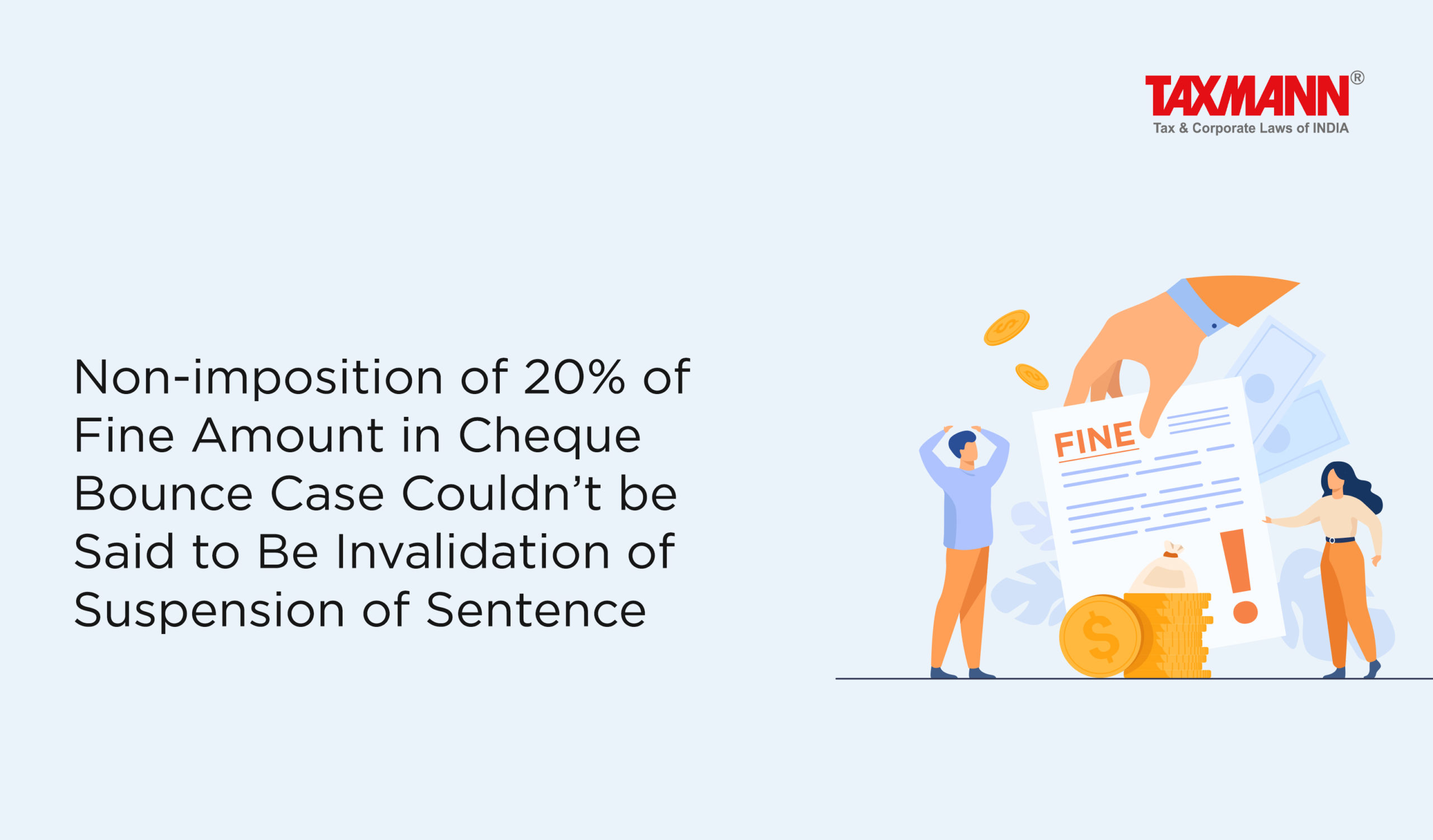Non-imposition of 20% of Fine Amount in Cheque Bounce Case Couldn’t be Said to Be Invalidation of Suspension of Sentence
- News|Blog|FEMA & Banking|
- 2 Min Read
- By Taxmann
- |
- Last Updated on 28 August, 2023

Case Details: Gulshan Arora v. State of NCT of Delhi - [2023] 153 taxmann.com 37 (HC-Delhi)
Judiciary and Counsel Details
-
- Ms Swarana Kanta Sharma, J.
- Prem Kandpal, Nakul Singal, Ms Yogita Bansal & Himanshu, Advs. for the Appellant.
- Satish Kumar, APP, Kunal Anand, Sandesh Kumar, Jai Batra & Amresh Bind, Advs. for the Respondent.
Facts of the Case
In the instant case, the petitioners were held guilty u/s 138 of the Negotiable Instruments Act, 1881 by the Trial Court. The Trial Court sentenced the petitioners to the payment of a fine of Rs. 27.20 lakh to be paid within 45 days to the complainant, and in default, to undergo simple imprisonment for a period of six months.
On appeal, their sentence was suspended by the Appellate Court. No condition was imposed by the Appellate Court upon the petitioners to pay or deposit any amount of fine imposed upon them.
However, while deciding an application filed by the complainant under section 148, the Appellate Court directed the petitioners to deposit 20% of the amount of the fine imposed upon them by the Trial Court.
Thereafter, due to non-payment of the said amount, the Appellate Court vacated the order of suspension of the sentence due to non-payment of 20% of the amount of the fine within the stipulated time period and directed the petitioners to surrender within 7 days from passing of the said order.
Aggrieved by the orders of the Appellate Court, the petitioners approached the instant Court by way of the petition filed under section 482 of the Code of Criminal Procedure, 1973 seeking setting aside of the impugned orders.
High Court Held
The High Court held that merely because the condition to deposit 20% of the fine amount was not imposed upon petitioners at the time of suspension of sentence, it could not be held that vacation of the order of suspension of sentence upon non-fulfilment of such a condition imposed subsequently by the Appellate Court was bad in law.
Thus, an instant appeal against the order of the Appellate Court was to be set aside and petitioners were directed to deposit 20% of the amount of the fine, in default of which petitioners were to surrender before the Trial Court. Accordingly, the instant petition stands disposed of.
List of Cases Reviewed
-
- Surinder Singh Deswal @ Col. S.S. Deswal v. Virender Gandhi [2019] 107 taxmann.com 97/154 SCL 303 (SC) (para 23)
- Surinder Singh Deswal v. Virender Gandhi [2020] 115 taxmann.com 377 (SC) (para 17) followed.
List of Cases Referred to
-
- Arun Malhotra v. Gulshan Arora [CT Case No. 11160 of 2017] (para 2)
- Arun Malhotra v. Gulshan Arora [CIT Case No. 27782 of 2019, dated 22-10-2021] (para 7)
- Surinder Singh Deswal @ Col. S.S. Deswal v. Virender Gandhi [2019] 107 taxmann.com 97/154 SCL 303 (SC) (para 13)
- Surinder Singh Deswal v. Virender Gandhi [2020] 115 taxmann.com 377 (SC) (para 17).
Disclaimer: The content/information published on the website is only for general information of the user and shall not be construed as legal advice. While the Taxmann has exercised reasonable efforts to ensure the veracity of information/content published, Taxmann shall be under no liability in any manner whatsoever for incorrect information, if any.

Taxmann Publications has a dedicated in-house Research & Editorial Team. This team consists of a team of Chartered Accountants, Company Secretaries, and Lawyers. This team works under the guidance and supervision of editor-in-chief Mr Rakesh Bhargava.
The Research and Editorial Team is responsible for developing reliable and accurate content for the readers. The team follows the six-sigma approach to achieve the benchmark of zero error in its publications and research platforms. The team ensures that the following publication guidelines are thoroughly followed while developing the content:
- The statutory material is obtained only from the authorized and reliable sources
- All the latest developments in the judicial and legislative fields are covered
- Prepare the analytical write-ups on current, controversial, and important issues to help the readers to understand the concept and its implications
- Every content published by Taxmann is complete, accurate and lucid
- All evidence-based statements are supported with proper reference to Section, Circular No., Notification No. or citations
- The golden rules of grammar, style and consistency are thoroughly followed
- Font and size that’s easy to read and remain consistent across all imprint and digital publications are applied



 CA | CS | CMA
CA | CS | CMA
